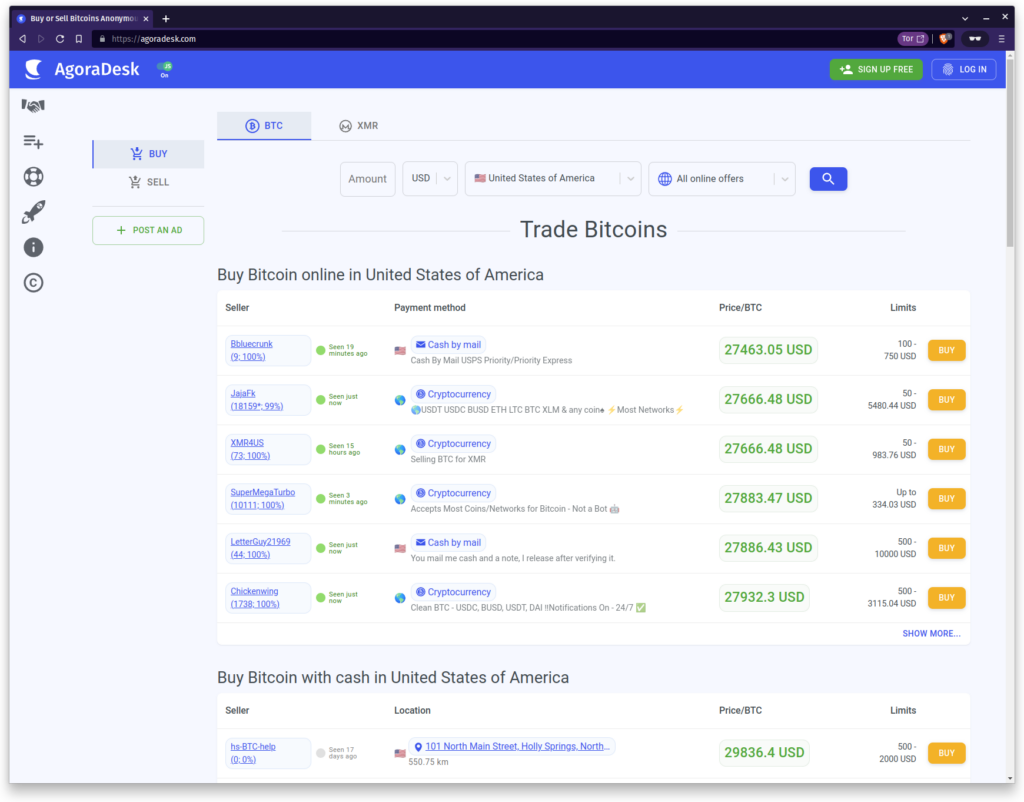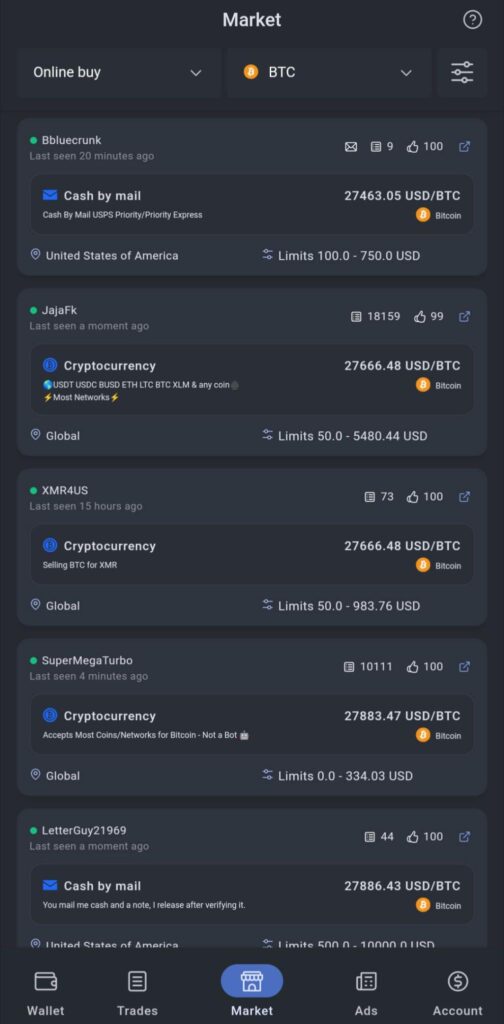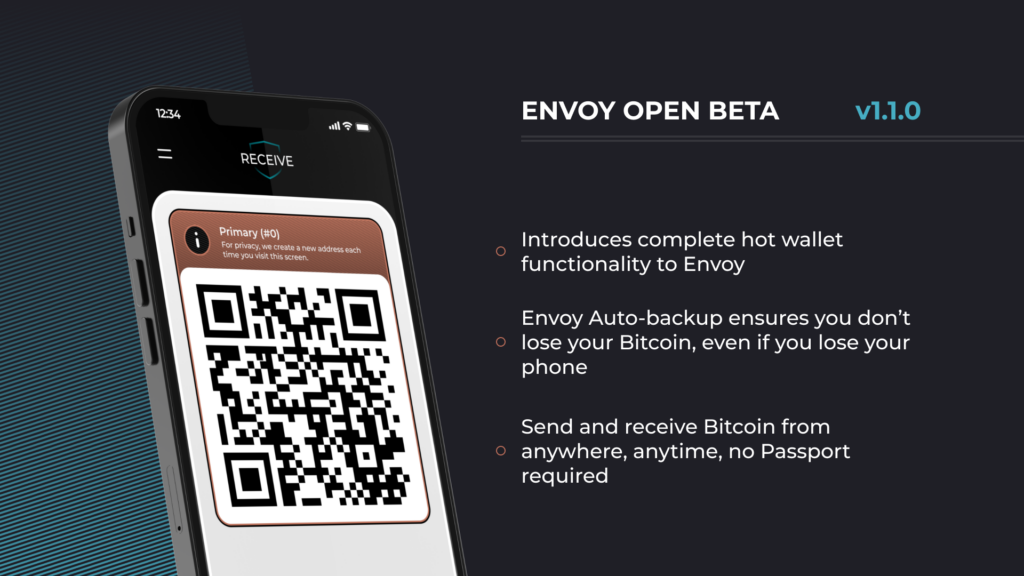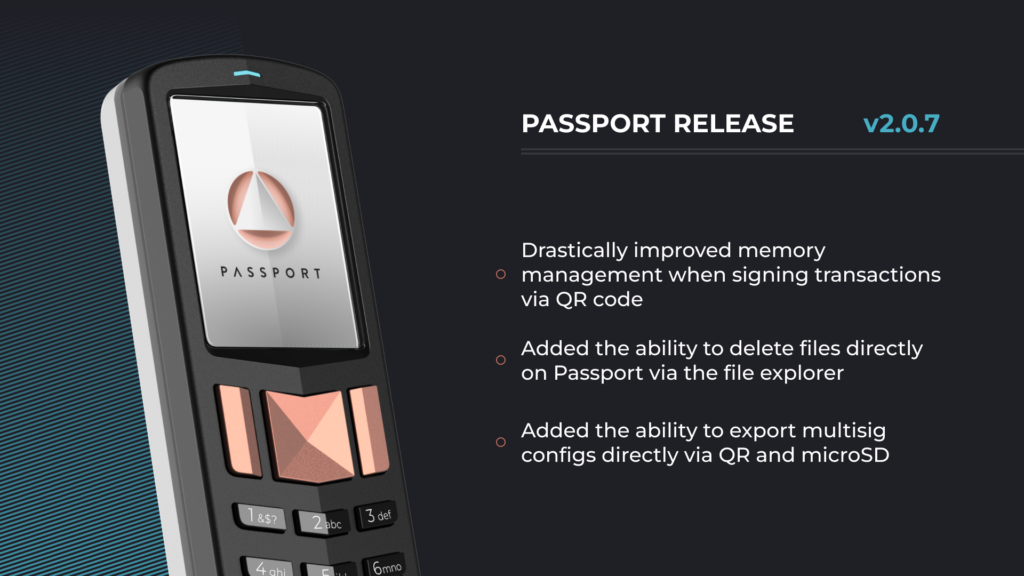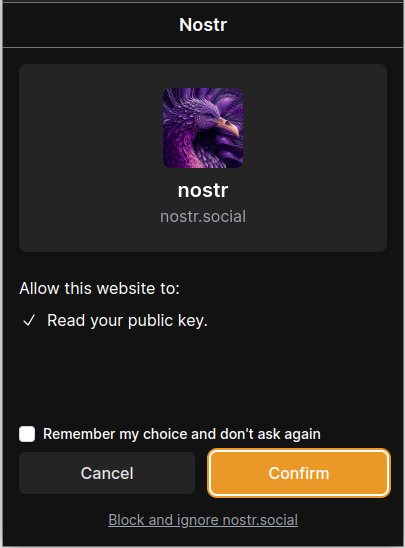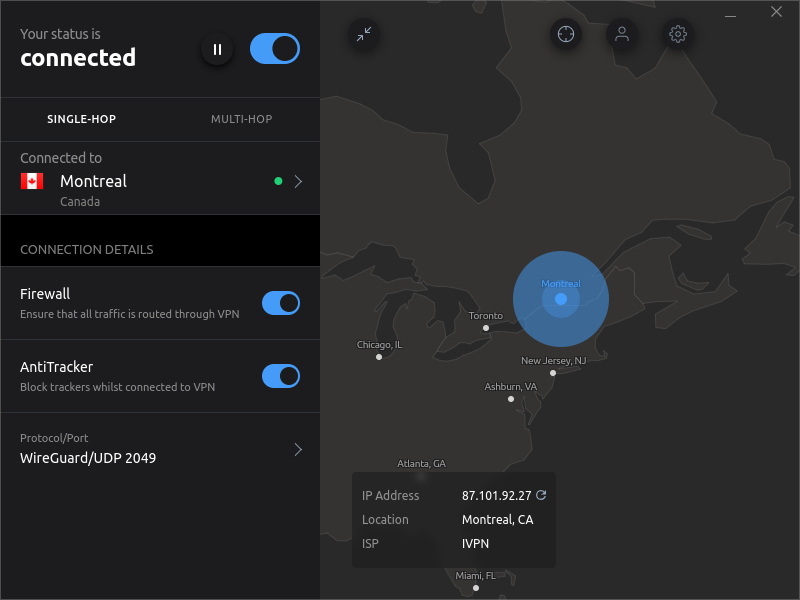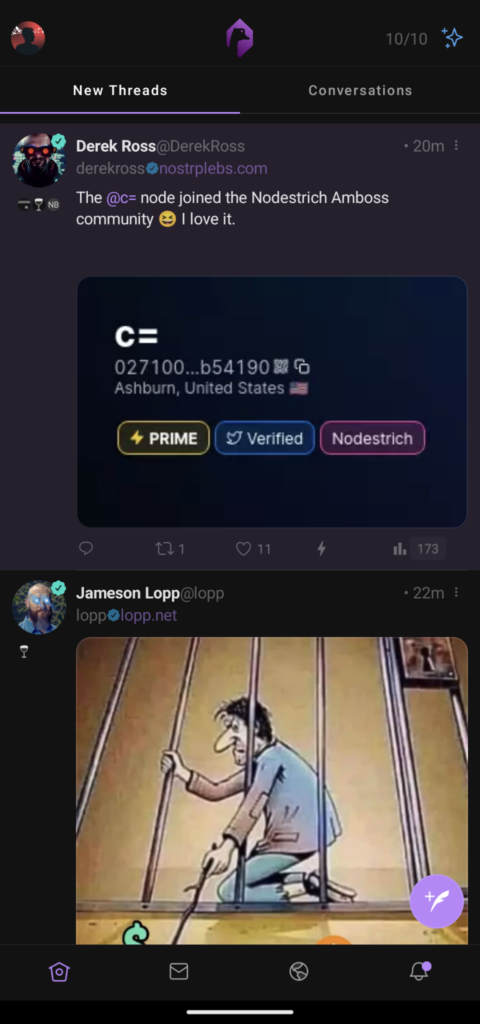
As governments attempt to stanch the bleeding of citizens waking up to the need for freedom and fleeing the dollar for harder money, they are rapidly shutting down the centralized, surveilled, and regulated on and off-ramps that the Bitcoin ecosystem has relied on for so many years. The resulting tightening of regulation and control should be a helpful push for each of us to explore the tools available for buying and selling Bitcoin as we need without trusting third parties, giving up Personally Identifiable Information (PII), or giving up custody of our Bitcoin.
The search for a powerful and yet easy-to-use peer-to-peer (P2P) platform for buying and selling Bitcoin has been a complicated road, but the last few years have seen rapid growth, added liquidity, and improvements in the tools we have at our disposal. In this post we’ll break down what a P2P exchange is, why we need them, and how you can approach using some of the best out there today.
Why we need P2P exchanges
When Satoshi set out to create Bitcoin, he envisioned a world where Bitcoin freed us from the control and surveillance of third parties, banks, or custodians. A world where we have ultimate control of our money, we contribute to network security through mining, running a node, and paying network fees, and where we can carve out the middle-man we’ve had to endure in the modern financial system. Instead, much of the Bitcoin ecosystem today centers around custodial exchanges that charge fees, collect sensitive information about Bitcoiners and their on-chain activity, and constantly rug pull users intentionally or due to hacks and theft.
What is needed is an electronic payment system based on cryptographic proof instead of trust, allowing any two willing parties to transact directly with each other without the need for a trusted third party.
Satoshi Nakamoto
Thankfully, even though these exchanges have dominated the Bitcoin space so far, developers and Bitcoiners have been working tirelessly to build tools that keep the middle-man out of our fiat <> Bitcoin trades and allows us to embrace the intended form of Bitcoin – one that is censorship-resistant, non-custodial, and P2P in nature. Bitcoiners trading with other Bitcoiners is the path towards making Bitcoin much more resilient to attacks by nation states and regulators, and is key for us to be able to continue using Bitcoin with or without the State’s approval. No banks required.
What is a P2P exchange?
Though most of us are familiar with the flow of using a centralized exchange, few Bitcoiners have ventured into the waters of P2P exchanges yet. As a result, the thought of breaking the centralized paradigm and trading directly with other people can be daunting, but thankfully the reality is far more approachable! In a P2P exchange, you’re no longer trading with a faceless corporation or trading desk, but instead you’re working directly with other Bitcoiner’s like you to buy and sell Bitcoin as you need.
While the exact approach to using these tools can differ, the core principle is the same. For this scenario, let’s assume you want to buy Bitcoin:
- The platform hosts an “order book,” letting you easily see what amounts are available at what prices.
- You select an offer you want to take, and a trade is created between you and the “maker” of the offer.
- The maker deposits Bitcoin into a multisig wallet you share to ensure that he can’t run off with your fiat.
- You coordinate fiat payment with the maker, usually something like Zelle, Cash App, Revolut, or cash face-to-face or by mail.
- Once fiat payment is completed, the maker confirms he received the fiat and releases the Bitcoin to be sent directly to your wallet.
And that’s it! In reality it’s a simple and uncomplicated process, but does differ from the flow we’ve all become accustomed to with centralized exchanges. You just traded fiat for Bitcoin directly with another human without involving any intermediaries, without sacrificing your personal privacy, and without giving up custody of funds to an exchange for a prolonged period of time. P2P exchanges are the future.
Our best options today
So what are you waiting for? Let’s dive into our favorite options out there today, learn a bit about them, and go over some resources that are helpful when getting started. The beauty of a free and open ecosystem driven by people like you is that there is a broad range of tools available, each with a unique set of benefits and tradeoffs.
A quick note: though it might be confusing, most of the P2P options that are widely used still rely on a centralized website in order to find buyers and sellers. However, even though there is a centralized website or platform in most of these tools, they don’t hold your Bitcoin, don’t collect personal information, and merely serve as a gateway to trading safely and securely with other Bitcoiners. Also, the list below is in no particular order, we love all these P2P exchanges equally.
AgoraDesk
AgoraDesk is a platform in the vein of LocalBitcoins (RIP), providing a simple and intuitive platform for buying and selling Bitcoin P2P. When you trade on AgoraDesk, you create a simple profile (no PII involved!), select an offer according to the payment method you prefer, and trade directly with other humans. AgoraDesk also recently launched an excellent open-source mobile app, making it far easier to buy and sell Bitcoin on the go.
How it works
AgoraDesk is a centralized platform with a company behind it that acts as an arbitrator for trades in case of any dispute. When a seller creates an offer, the seller has to lock Bitcoin (equal to the trade amount) in an “arbitration bond,” providing funds that will be used if the seller attempts to back out of the trade or run off with your fiat. If the seller follows through, the appropriate amount of Bitcoin gets sent to you after the seller confirms receipt of your fiat, and all is well. If the seller attempts to steal your fiat or fails to follow through on the trade, an arbitrator gets involved and their arbitration bond (equal to the amount owed to you) is sent to you as compensation.
As long as you read carefully along the way and be sure to follow all steps properly, there is no way that a malicious seller can scam you out of your funds.
More here: FAQ — AgoraDesk
Learn more
- AgoraDesk
- AgoraDesk’s main website, also available as a Tor Onion site.
- AgoraDesk guides: how to buy or sell cryptocurrencies
- AgoraDesk has easy to follow guides for every step of the process.
- P2P Trading with Agoradesk. – Life KYCfree
- This step-by-step guide created by an awesome member of our community is a go-to resource for anyone new to AgoraDesk.
Hodl Hodl
Hodl Hodl is a very similar platform to AgoraDesk, focusing on buying and selling Bitcoin P2P. They never custody your Bitcoin, never hold your fiat, and seek to protect your privacy from the moment you start using their platform. Simply sign up with an email and password, pick (or make) an offer for the payment method you want to use, and get Bitcoin directly to your wallet. No KYC. No middle-man. No custodians.
How it works
Hodl Hodl is also a centralized platform with a company that acts as an arbitrator in the case of a dispute. When you accept an offer, the seller and you create a 2-of-3 multisig escrow along with Hodl Hodl. This multisig ensures that if the trade goes well you and the seller can collaborate to send the Bitcoin to your wallet properly, but if the seller is malicious or fails to follow through on the trade an arbitrator can step in and assist. If the seller fails to follow through, an arbitrator can review the trade and send the Bitcoin to the harmed party (whether buyer or seller), ensuring that good actors don’t lose any funds.
As long as you read carefully along the way and be sure to follow all steps properly, there is no way that a malicious seller can scam you out of your funds.
More here: Hodl Hodl – Why is trading on Hodl Hodl secure?
Learn more
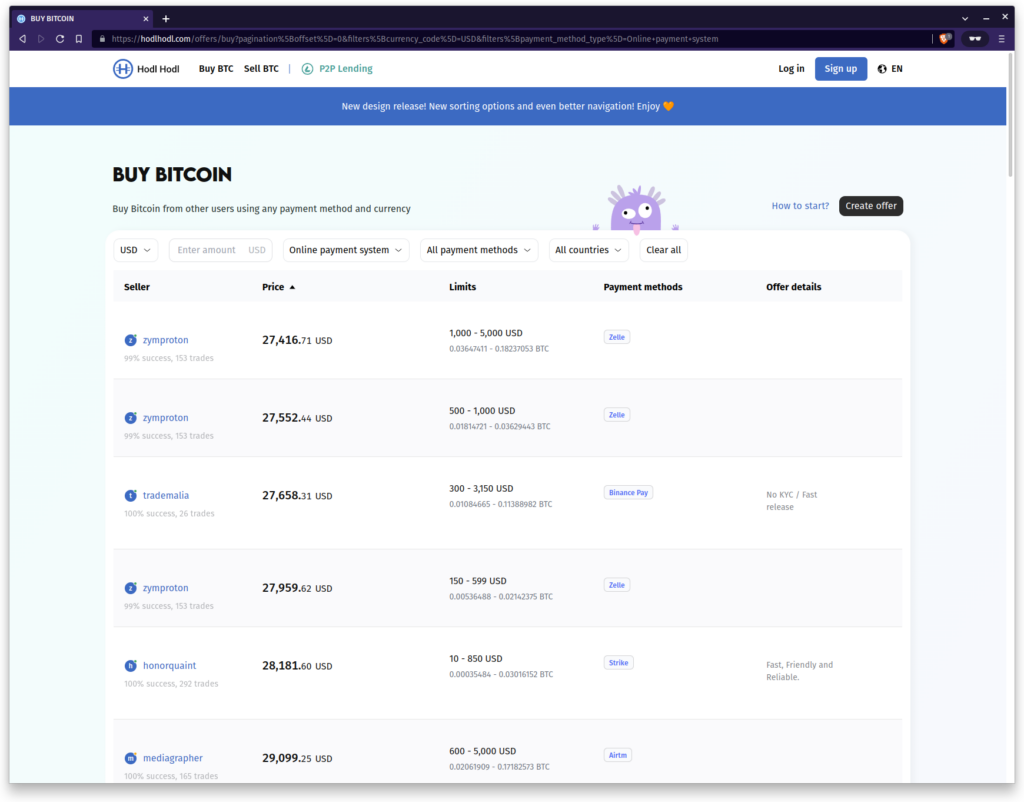
- Hodl Hodl
- Hodl Hodl’s main website.
- Hodl Hodl – Help Guides
- A quick-start to using Hodl Hodl, including frequently asked questions.
- 10 steps to your first non-KYC bitcoin (Hodl Hodl Edition)
- A guide by our own Bitcoin QnA on bitcoiner.guide.
Peach Bitcoin
Peach Bitcoin is one of the newest P2P exchanges to leap onto the scene over the last year, and has become a favorite of many in our community even while it remains in beta. Peach Bitcoin is a simple app that connects you with sellers directly, facilitating trades in a very similar fashion to AgoraDesk and Hodl Hodl but with a focus on mobile, intuitive user experience, speed, and a modern UI.
Peach also helps you backup your app in a self-sovereign way, save fiat payment methods for easier trades, and much more.
How it works
Peach Bitcoin is a centralized platform that acts as the arbitrator in trades. When a seller creates an offer, the seller sends Bitcoin to a 2-of-2 “decaying” (more on that later) multisig wallet that he shares with Peach, ensuring that he can’t send funds without Peach’s approval and Peach can’t steal funds themselves. If the trade goes properly, the seller and Peach will work together to send funds to your wallet directly. If the seller is malicious or fails to follow through, after 30 days the multisig will decay to a 1-of-2 and Peach will control the funds, sending them to the buyer appropriately. This approach allows trades to proceed much more quickly as the seller’s Bitcoin are already locked in the multisig escrow and confirmed on-chain before a buyer even accepts the trade.
As long as you read carefully along the way and be sure to follow all steps properly, there is no way that a malicious seller can scam you out of your funds.
More here: Trading FAQ · Peach Bitcoin
Learn more

- Peach Bitcoin
- Peach Bitcoin’s main website.
- Quick Start · Peach Bitcoin
- A step-by-step guide to setting up your account, making and taking offers, and using Peach from start to finish.
Robosats
Robosats is an incredibly innovative P2P exchange built around the Lightning Network, enabling you to buy and sell Bitcoin directly on Lightning from other people across the globe. Robosats can only be used over Tor, ensuring that you have strong privacy from both Robosats themselves and the peers you trade with.
Not only that, but each time you use Robosats you quickly generate an entirely new “Robot,” giving you a new pseudonym and account to transact under. You should always backup the token Robosats gives you to recover your active trades if you delete the app or close the website while an offer or trade is active. If you’re an active Lightning user, Robosats is an important tool in your toolkit and an awesome P2P exchange.
How it works
Robosats is a centralized platform where they act as an arbitrator in the case of a dispute like the other options, but as it’s a Lightning-centric platform the methods differ. When a seller opens a trade, the seller locks a “fidelity bond” of a small percentage of the total trade amount. When a buyer takes the trade, the buyer also locks a small fidelity bond of the same percentage, and if either buyer or seller fails to follow through in a timely manner their bond is forfeit to the honest party. Once the trade is in-progress, the Bitcoin seller locks funds in an escrow “hold invoice” to Robosats wallet and the buyer provides an invoice of the same amount to Robosats.
If the trade is successful, the fidelity bonds are returned to the buyer and seller appropriately, and the locked hold invoice pays out to Robosats, who then pay out the full amount to the buyer’s provided invoice. If the trade is unsuccessful and one party is malicious and tries to game the system, a dispute can be opened where an arbitrator steps in and determines the honest party, rewarding them the fidelity bond of the malicious party and sending the sellers Bitcoin to the buyer if fiat has already changed hands.
As long as you read carefully along the way and be sure to follow all steps properly, there is no way that a malicious seller can scam you out of your funds. Note that in order to make your first trade on Robosats you do need to already have Bitcoin in order to lock the fidelity bond upon making or taking a trade.
More here:
Learn more
- Robosats
- The main website of Robosats, walking you through what it is and how to use it, step-by-step.
- https://unsafe.robosats.com/
- A non-Tor instance of Robosats for you to experiment with, but please only use the Tor Browser or the mobile app for real trades!
- Releases · Reckless-Satoshi/robosats
- You can download and install the new Robosats Android app directly from this Github link.
- Wallets Compatibility with RoboSats
- Learn which Lightning wallets work best with Robosats, as they use a unique approach to Lightning invoices that doesn’t always play nicely with Lightning wallets.
Bisq
Bisq is the only P2P exchange for Bitcoin that is truly decentralized in nature and does not rely on a single website or entity for its functionality. This makes Bisq an extremely resilient platform for buying and selling Bitcoin, even in the harshest adversarial environments around the world. Bisq operates as a standalone desktop app that natively integrates the Tor network for preserving your privacy when communicating with the Bitcoin network, the Bisq network, and your trading peers.
While Bisq doesn’t have the more familiar UX of other options we’ve given, it provides an option that is viable in almost any scenario and should be much more resistant to pressure over the long run.
How it works
Bisq stands apart from the other options on this list due to its true decentralization, and as a result has a slightly different model for security. When a seller creates an offer and when a buyer takes an offer, both buyer and seller lock security deposits (with the amount being set by the seller). When the trade begins, the Bitcoin being sold is sent to a shared 2-of-2 multisig wallet between the buyer and seller, ensuring that neither party can steal funds from the other. If the trade is successful, the buyer and seller both sign to send the funds to the buyer’s wallet directly.
If either party is malicious, a dispute can be opened where arbitrators from the community are engaged to help decide the honest and malicious parties and properly award the security deposits. If no resolution can be reached between both parties, the funds can be sent to a Bisq community donation address by either party and the arbitrator can reimburse the honest party from the Bisq DAO.
As long as you read carefully along the way and be sure to follow all steps properly, there is no way that a malicious seller can scam you out of your funds or prevent you from being reimbursed by an arbitrator. Note that in order to make your first trade on Bisq you do need to already own Bitcoin, as you must lock a security deposit when making or taking offers.
More here: Frequently asked questions – Bisq Wiki
Learn more
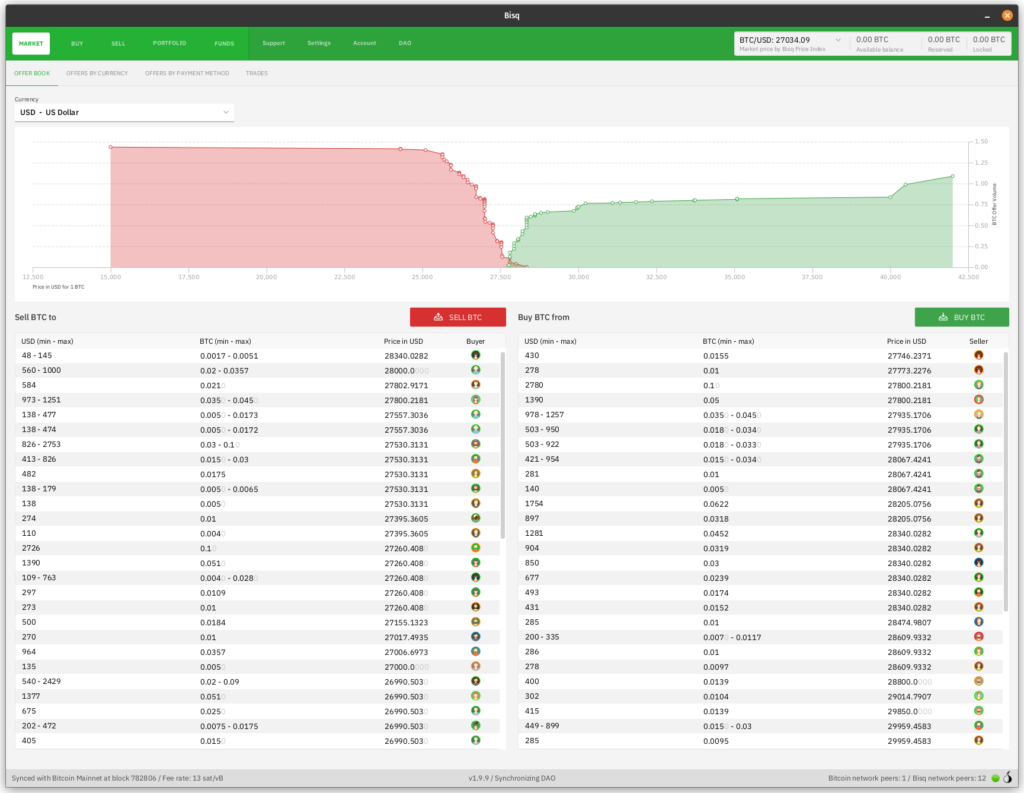
- Bisq
- Bisq’s main website, with download links and guides.
- Getting Started ‹ Bisq – A decentralized bitcoin exchange network
- A great guide to getting started with Bisq, from downloading the app to making your first trade.
- 10 Steps to your first non-KYC bitcoin
- Another great guide by BitcoinQnA, this walks you through the process of using Bisq from start to finish.
Azteco Vouchers
Azteco is an entirely different beast, and actually not a P2P exchange at all so we’ve added it as a bonus! Azteco is on this list still as it provides a powerful way to buy Bitcoin directly from corner shops and retailers in many countries without providing ID or even creating an account anywhere. Azteco does this by creating Bitcoin vouchers (just like those “top up” SIM cards) that you can buy for cash or with a credit card in person. Simply buy a voucher in person, go to azte.co, and redeem the voucher directly to your Bitcoin wallet. Azteco has many of the same benefits as normal P2P exchanges, and is a great option if you want to buy in person but don’t have any P2P sellers in your area on something like AgoraDesk or Hodl Hodl.
How it works
Azteco is obviously very different from the other options listed here, and is entirely custodial until you redeem the voucher given to you when you purchase. As such there is no risk of a malicious peer stealing your Bitcoin, but of course you are trusting Azteco to properly send the Bitcoin when you go to redeem the voucher!
The only key thing to watch out for is to be sure the Azteco vendor you choose is properly listed on their site before buying a voucher to prevent unknowingly buying counterfeit vouchers.
More here: Azte.co
Learn more

- Azte.co
- Azteco’s main website.
- Find An Azteco Bitcoin Vendor
- Quickly find a vendor near you with an interactive map.
What to look forward to
We’ve only scratched the surface of what can be built for empowering use of Bitcoin without needing banks, and the recent explosion is strong evidence that the concept of P2P exchanges is taking off. We’ve been thrilled to see new apps like Peach Bitcoin and Robosats rapidly growing in volume and usage, and can’t wait to see what ingenious tools get built in the coming years. As more and more Bitcoiner’s start to use P2P exchanges to buy and sell Bitcoin, the future becomes brighter for how easy these tools are to use, how much liquidity is available, and how much funding goes to building them out.
We hope that this list gives you practical ways that you can start to use Bitcoin without involving the traditional banking system, enabling you to access Bitcoin without permission and without surveillance. Now let’s get out there and build a better world with Bitcoin at its core.
